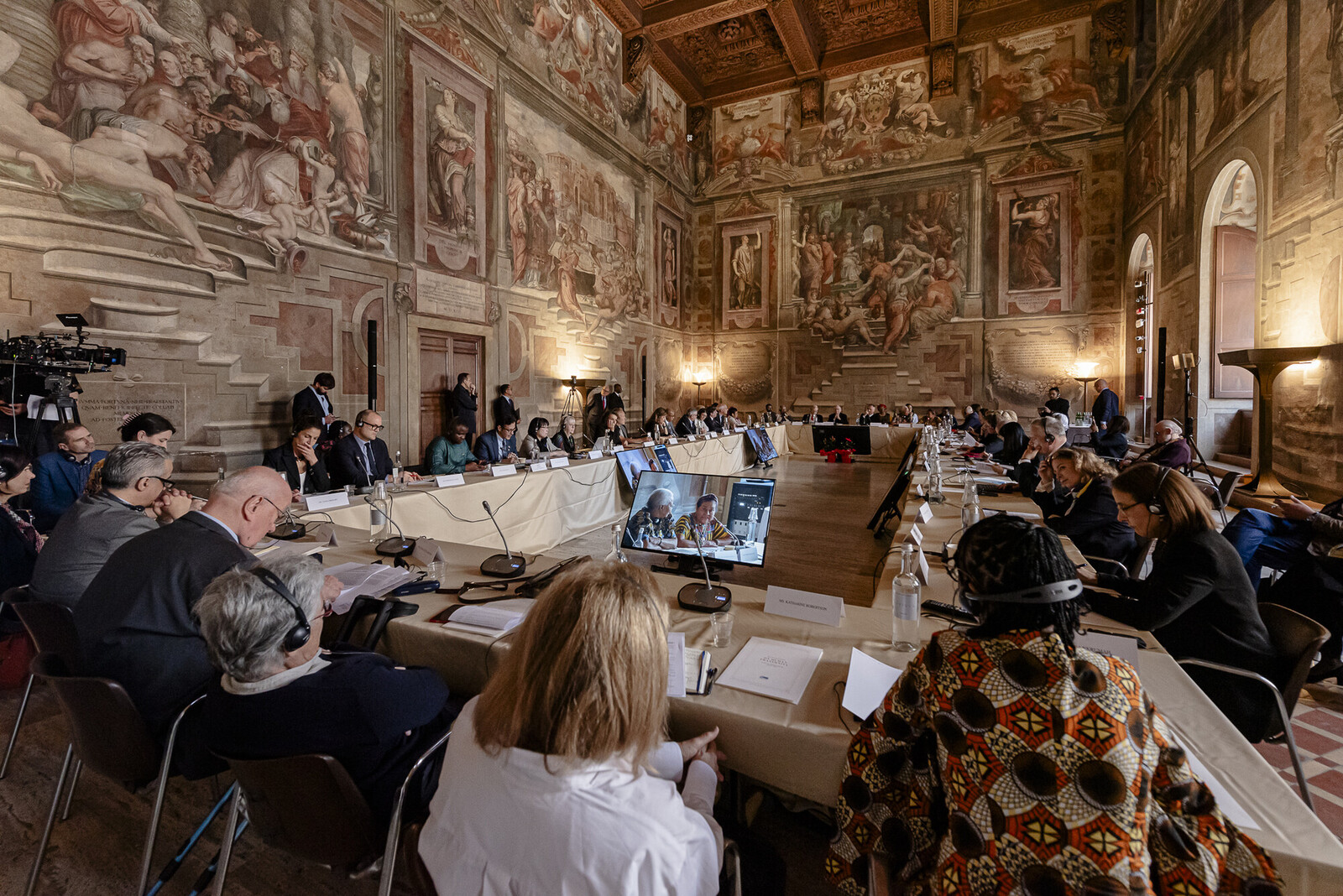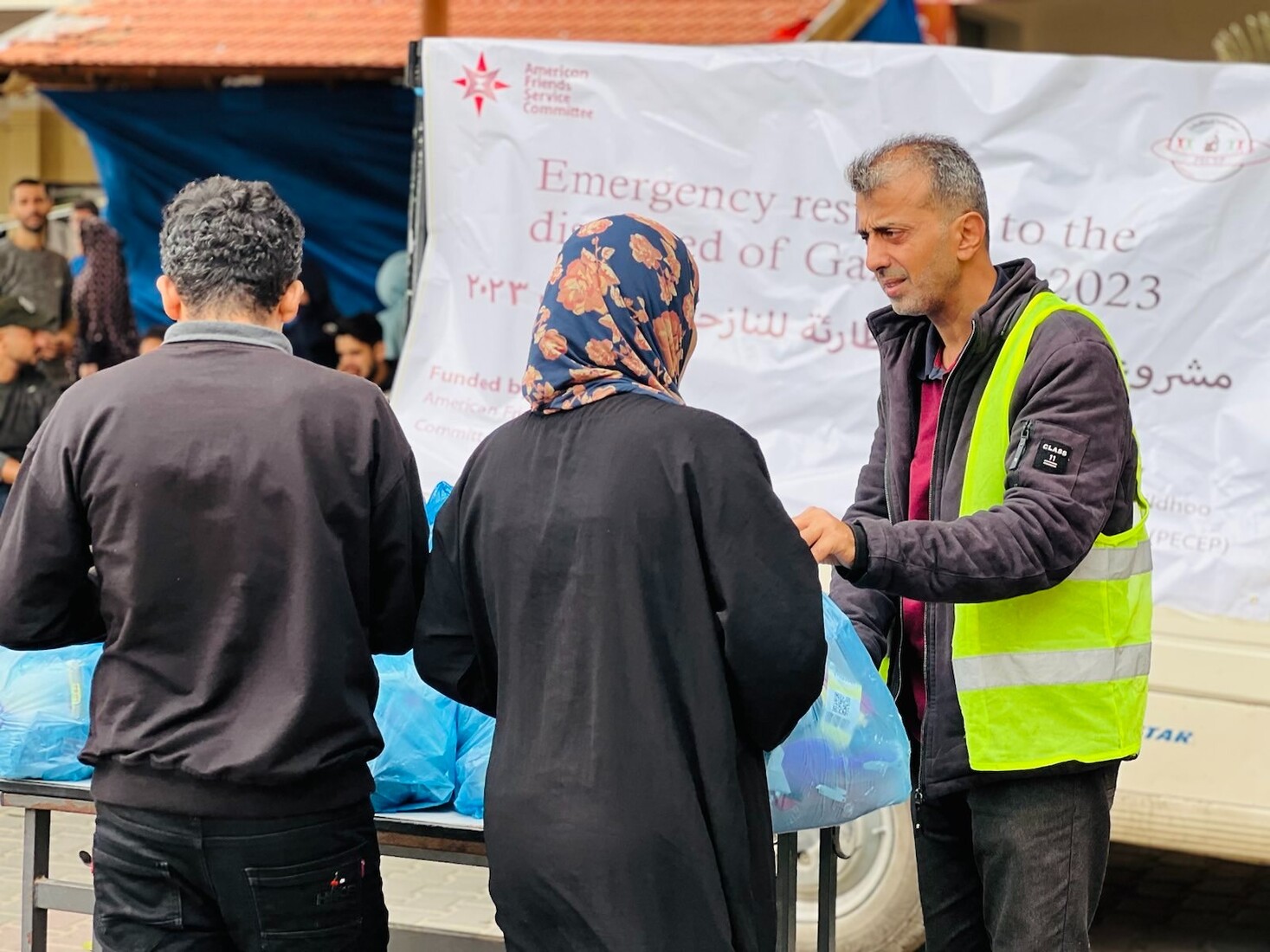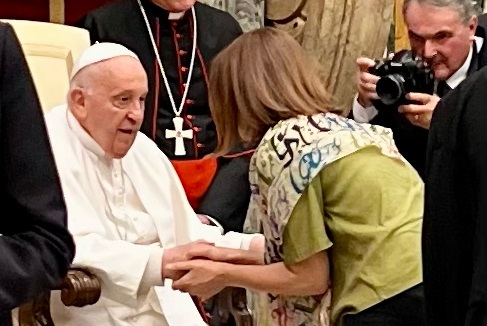
AFSC's Joyce Ajlouny (far right) at a meeting with Nobel laureates and other dignitaries at the Vatican. Photo: DIEGOANTONELLIFOTOGRAFIA
Just a few weeks ago, I had the profound honor of joining 30 Nobel Peace Prize laureates and many other peace advocates at the Vatican. I was there to represent AFSC, which, along with the British Friends Service Council, accepted the prize on behalf of all Quakers in 1947 for our efforts to heal rifts and oppose war. I traveled there just after visiting with AFSC staff in the West Bank and Jordan.
At the Vatican, I was inspired to engage with courageous leaders who have forever changed our world for the better. The occasion was the second World Meeting on Human Fraternity. The purpose of the gathering was to strengthen solidarity and peace in the face of wars and violence around the world. There was Rigoberta Menchú Tum, who has devoted her life to advocating for the rights of Indigenous people in Guatemala. There was Maria Ressa, an investigative reporter championing press freedom in the Philippines. I also met Tawakkol Karman, who was at the forefront of the Arab Spring in Yemen. And Jody Williams, a leader in the international campaign against landmines. And many others.
We worked together on a declaration that called on all nations to commit to peace, justice, and human rights for all. As a Palestinian-American and Quaker dedicated to building peace, I felt it was important for us to have a truthful conversation about the crisis in Gaza. Our declaration was much more meaningful than just a simple global call for peace. It was bold in bringing in imperatives of justice and accountability, and clear in speaking out against the human toll of the attacks on Gaza and the need for international action:
“An immediate and permanent ceasefire in the Gaza Strip must be declared to stop the killing and ensure safe and unrestricted access for humanitarian aid. … The children of Gaza, nearly 14,000 killed by weapons of war and dying from hunger and disease, who cannot shelter in hospitals that are being bombed, can no longer wait. ... Hostages and political prisoners must be immediately released.”
While at the Vatican, my mind was never far from AFSC’s own team in Gaza. For over six months, Firas, Serena, and Adham have worked with our volunteers and partners to deliver food, water, blankets, and other life-saving aid to hundreds of thousands of people. All the while, they have faced grave personal losses and dangers themselves. Some of them were also among the over 1 million Palestinians forced to flee Rafah recently as Israel launched its ground invasion of the city.

AFSC's Firas Ramlawi distributes supplies in Gaza. Photo: AFSC/Gaza
Beyond Gaza, Israeli violence against Palestinians has also escalated in the West Bank. During my late-April visit to Ramallah and Amman, I met with AFSC’s Middle East regional staff while spending quality time with family and friends. I heard firsthand accounts about increasing Israeli raids and restrictions on movement. Since October, the Israeli military has arrested more than 8,000 Palestinians in the West Bank, subjecting many to torture and holding most without charge. My sister-in-law’s family is in anguish after Israeli soldiers arrested their daughter during a 3 a.m. raid on her home. One of my former colleagues at Ramallah Friends School was also detained and finally released. After months in an Israeli jail, the burly, vociferous teacher I remembered had become skin and bones.
Israeli settler attacks on Palestinians have also intensified. Settler violence and harassment have pushed out residents of entire towns. Many Palestinians now avoid traveling very far for fear of attacks on the road. A young volunteer who works with my son planting vegetables used to work in a town just 20 minutes from her village home, north of Tulkarem. She quit her job because it became too dangerous for her to drive there.
Whether in Gaza, the West Bank, Israel, or any place on the planet, every Palestinian has been changed by the past seven months. We’re facing a collective trauma. Everything we do, every minute of the day, we are haunted by the genocide of our people—as much of the world looks on.
But there are still things that give us hope. When I was in the West Bank, so many people wanted to talk to me about the college protests taking place across the United States and in other countries. They have been deeply moved by these bold acts of solidarity.
I also saw how people in the West Bank have found creative ways to help those in Gaza, even though they can’t travel there or send aid. University professors are offering online classes for students in Gaza so they can continue their studies. Radio stations are broadcasting children’s lessons since people in Gaza still have access to radio. Another organization sent people in Gaza sketches with instructions on how to create DIY tents.
Here in the United States, not a day goes by that I am not grateful for the generosity of people who have supported AFSC’s emergency response and mobilized to demand a cease-fire. These are some of the vital ways that countless people are showing solidarity and humanity in these most difficult times.

AFSC's Joyce Ajlouny meets with Pope Francis.
I am also encouraged by the peace declaration that Nobel laureates delivered to Pope Francis. When I had the chance to meet him, I thanked him for praying for peace in Gaza and in the world. He held my hand tight. He told me that he calls the Catholic parish in Gaza every day and continues to pray for the freedom of Palestine.
During his address to our group, Pope Francis said: “To ensure lasting peace, we must return to a recognition of our common humanity and place fraternity at the centre of peoples’ lives. Only in this way will we succeed in developing a model of coexistence capable of giving the human family a future.”
Let us all remain steadfast in our efforts to make this vision for peace a reality.
